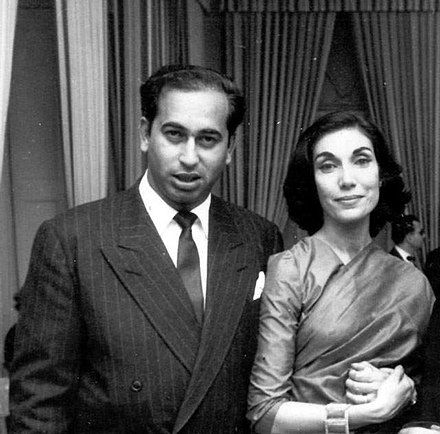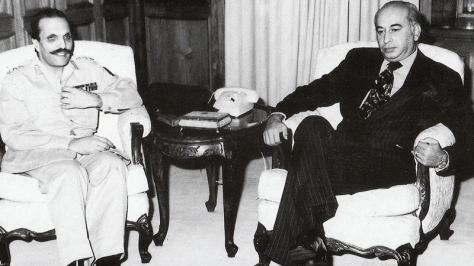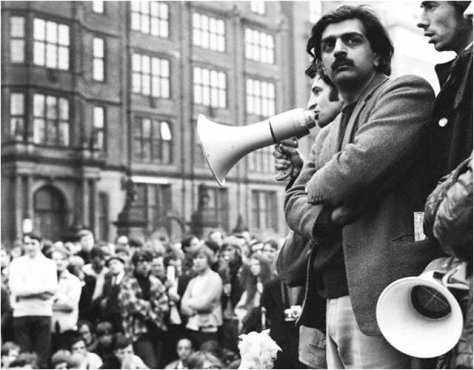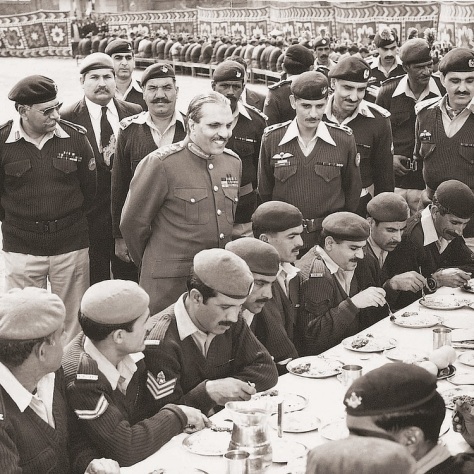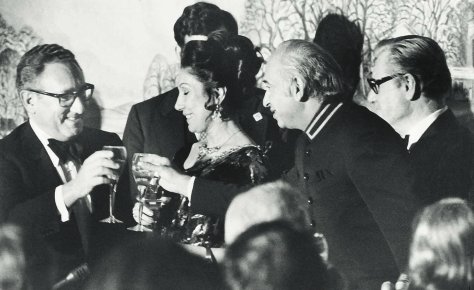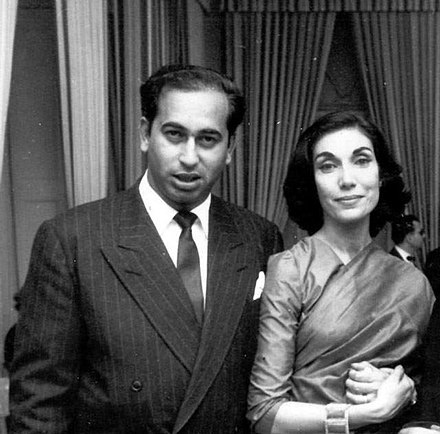
Just an opinion as a prelude, when states fail their people, people then fail their states.
The victorious political party has a fixed period of time to win their people’s trust and act on the promises they spoke in their speeches. When the government fails, the nation looks after the other party who can do their work better than the current one. Time passes by, decades crosses, economy goes down and corrupts, the environment pollutes, societies lose morality, rich people invest money on survival, middle and lower classes frustrates and blames, and refuses and abuses, and fights and ignites, and doubts and shouts, and daydreams and screams, and cries and dies.
On the earth, the national deludes but in the grave, the national complains. We are not sophisticated people, we are colonized people. We do not rule, we are ruled. We are a nation who follows and revolves around ‘Cipher’. We are a puppet who is functioned by the other pair of hands. We have been played by the people in the supreme power for more than a century. The power is a supreme authority which can manipulate great minds. So when the extreme power strikes its spell like the beauty attracts to a man, the greatness turns in to greediness. The acts hold wrongdoings clean and cleam. The nation is further deceived and colonized.
A group of people with the right set of mind with an ideal vision in favor of the nation especially the poor are robust against disgust. They struggle without snuggle, raise their voice for change and whisper the hopeless ears that ‘we are the avengers to bring bad people in power to the highest court of justice and punish them, we are the masons to build and hold the broken wall, we are the defenders of solidarity and contributors to prosperity, we are the rescuers of the rights and advocates of the political revolution, and with the nation lost and frost we want to be the reason for the change in nation’s fate and fortune’. It is extremely painful to survive after being repeatedly deceived, the existence with such suffering only waits for the call of Azrael. It is highly likely to build a belief that there is still a helper offering a helping hand to change his/her fate and fortune. With new people in power on the same chairs, there is nothing but hope. And hoping is believing.
POLITICAL TURMOIL
(INTERNATIONAL)
After George W. Bush‘s declaration of War on Terror, things have gone further wrong in Pakistan’s way. With former General Parvez Musharraf joining hands with Bush on War On Terror and making the biggest blunder in Pakistan’s political history in the 21st century, Pakistan achieved nothing but suffered heavy losses physically and economically. The casualties are counted to at least 60,000 people and financial loss of more than a $100 billion in supporting what Bush began. But here is to admit the ugly truth that many of Al-Qaeda biggies were caught from Pakistan including the big bad news, Osama Bin Laden. After all these years of hiding, where was he finally found? In Abbottabad! In a compound which was located less than a mile from the Pakistan Military Academy. And Abbottabad is hardly one hundred kilometers away from the capital. More to the embarrassing mess, according to Bin Laden’s wife, he was living or hiding in that compound for five years! Oh boy oh boy oh boy!
(I will additionally recommend the readers to read a very interesting article from the mid-2007 issue of Foreign Affairs, A False Choice In Pakistan by Daniel Markey focusing on post 9/11, War on Terror and policy/relation with Pakistan and Pakistan’s internal issues and conflicts, even dangerously doubting on them if they are the trusted allies of the US.
Also, check another detailed report from the directory of the Federation of American Scientists about the political instability of Pakistan by Alan Kronstadt. This research was published in 2014.)

Pakistan’s further stress towards the motion of building or shaping a political harmony is their relationship with Saudi Arabia and Iran. After decades of the brotherhood with Saudia, Pakistan is observed to be inclined more towards Iran in the recent times. Back in 2015, when the Kingdom called for the military support in the Yemen fight against the Houthis, Pakistan declined to support giving the impression that Iran was backing Pakistan for this. The Houthi rebels are the movement of conflict with the Zaidi ideology of the Shia sect heavily backed financially and militarily by the Iranian government. As per the 2012 report from the US official site, most of Yemen’s 35% Shia population is of Zaidi sect.
Pakistan under the new leadership also has to make an impression with the other Muslim countries that they are not dealing with the devils especially after signing billion dollars energy deals with Qatar and Russia. 5 Arab countries broke the ties with Qatar last year but Pakistan made an agreement with them before in late 2015 worth $16b to provide Liquefied Natural Gas (LNG) for the next 15 years. With Russia, Pakistan made an agreement of constructing Karachi-Lahore pipeline for the LNG transportation worth $2b also in 2015 and before this agreement, both Pakistan and Russia had signed a defense cooperation deal in late 2014 with Sergey Shoygu becoming the first Russian defense minister to visit Pakistan since 1969. This energy deal was also the countries’ first in 30 years. Knowing the fact that Iran and Russia both were backing Bashar al-Assad in the war crimes against his own people, Pakistan still went for it. From September 2015 onwards, Russia began heavily bombing in Syria.
Pakistan being a Sunni-dominated country has a 20% Shia population which disembarks them from the ground neutralities. The country would have to be someone’s proxy in the unwanted war. When Saudi Arabia launched Islamic Military Alliance (IMA) in December that year, 34 countries were involved which stretched to 41 later. All the participating countries were Sunni-dominated countries including Pakistan. With that understanding, all the Shia-dominating countries including Iran were not the part of it. To avoid the situation get worse, Pakistan hosted Iranian president Hassan Rouhani after a few months to reassure that Tehran is not an anti-Shia body. Saudia later on appointed the-then retiring Pakistan’s Chief of Army Staff, Raheel Sharif as the commander of the IMA.
(NATIONAL)
With Pakistan already suffering from the international politics, the country lost its accountability in the province of Balochistan. The insurgency by the Baloch Nationalists against the government is decades old but the recent phase of the growing tensions began from 2005 when Shazia Khalid was raped at the Sui Gas facility. It is widely believed that she was raped by an army officer but when Parvez Musharraf declared on the state channel that the culprit in the army uniform is not guilty, Nawab Bugti led the violent uprising. Years passed but the fight didn’t stop.
Besides, a ruinous political unrest was witnessed in past few years. The Model Town Tragedy of 2014 badly affected the reputation of the governing body with the police killing several Pakistan Awami Tehreek (PAT) protestors. Media broadcasters aired the shocking footages of a vandal, Gullu Butt, smashing windscreens of many parked vehicles by using a club and strangely leading the police squad attack the protestors. Furthermore, he was seen hugged by Tariq Aziz, SP of the same area. Butt was later arrested and then bailed out prompting heavy condemnation of both PAT and Pakistan Tehreek-e-Insaf (PTI). Tariq Aziz was later promoted as SSP Discipline and Inquiry in Lahore police HQ after Butt was bailed out. The-then Law Minister of Punjab, Rana Sanaullah, defended the police operation.

On the other hand, after no response from the government on the demand of probe of election fraud in four constituencies for 14 months and no response from the supreme court despite fraud allegation from the additional secretary of the Election Commission of Pakistan Afzal Khan, Imran Khan accused Nawaz Sharif of rigged elections and led a massive anti-government protest called Azadi March beginning from 14th Aug to the next 126 days. The slogan ‘Go Nawaz Go‘ went popular nationwide and among the Pakistani communities living across the globe from this event. But the use of this slogan dropped many cents of morality among the few anti-government lobbies that some of the pilgrims from Pakistan chanted the slogan during the pilgrimage and in the two holy cities.
THE DISTURBED GEOGRAPHY
Pakistan being one of the most insecure geographical places for the outsiders and one of the suffering regions by terrorism, met severe tragedies in the last few years indicating that the country has been under alarming target by the terrorist organizations. Among the few to mention and reflect the level of security crisis; Karachi airport was attacked by 10 militants of the Islamic Movement of Uzbekistan (IMU) and 36 people were killed back in 2014. Imagine the security situation of Pakistan’s other domestic and international airports when the country’s largest and busiest airport met this unfortunate event!
Sectarian clashes in the country have met tremendous hatred and grown concerns despite reinstating brotherhood for umpteenth times. The Afghan gunmen from Jundallah killed at least 45 Ismaili Shia passengers during open firing inside the bus in Karachi in 2015.
The shrine of Lal Shahbaz Qalandar has been one of the most significant historic sites where a million visitors show up every year. Last year, a suicide attack (believed to be orchestrated by ISIL) killed at least 90 people and injured 300 others during the Sufi ritual after the evening prayer.
Months later, a series of terror attacks by ISIL and Jamaat-ul-Ahrar resulted in 96 casualties collectively in three different cities on the same day. In 2016, Jamaat-ul-Ahrar were also responsible for killing at least 75 and injuring more than 300 people in Lahore’s Gulshan-e-Iqbal Park. The motive behind this terrorism was to kill the Christians who were celebrating Catholic Easter on that very day.

But the biggest tragedy amongst all the terror attacks was the Peshawar School Massacre when six gunmen affiliated with Tehrik-I-Taliban Pakistan (TTP) attacked the Army Public School by open firing on the school staff and children between the age range of 8 and 18. 149 people including 132 school children were killed that day becoming the world’s fourth deadliest school massacre ever. This event ripped me because this fact just couldn’t accept digest me or accept my mind that a terrorist can open fire on children. I wish the murderers rot in hell, Amen.
DIGGING KUFR
Safeguarding the minority community has also been the talking point in Pakistan especially after the War on Terror. Also, the minorities have been socially ill-treated and there have been cases of church attacks, burning temples and killing them.
Minorities, who comprised 23% of Pakistan’s population back in 1947 which has now dropped to 4% in recent years, have been in remote position due to non-acceptance, unrecognition or intolerance by the Muslims in the surroundings everywhere. The case of the non-Muslim communities of both Hindu and Christian faith are highly sensitive. The Hindus in Pakistan in the early 90s had to suffer the wrath after the historic Babri Masjid in Ayodhya, India was demolished by a large group of Hindu Kar Sevaks in 1992. In retaliation, more than two dozen temples were destroyed in one single day in Pakistan. Hardly two dozen of the temples for the Hindus remain in the country.

The Christian community has also suffered a series of setbacks in recent years. Over 40 houses and a church were set ablaze by the mobs in Gojra back in 2009. But a few months before the 2013 general elections, a twin suicide-bomb blast killed over 100 people and almost 250 injured at All Saints Church in Peshawar. Two years later, Lahore witnessed a bombing each at two different churches on the same day killing at least 15 people.
The case of the Ahmadi community is also very sensitive and plasters a dark and controversial image in Pakistan. Unnecessary to detail them but the community who were the advocates of Pakistan Movement, who supported Jinnah’s Muslim League for the establishment of a new Islamic state, who were one of the most prosperous and educated people after the independence, were victimized and targeted of their beliefs and killed in heavy numbers in 1953 and 1974. 2013 onwards, numerous events have crossed of their deaths. If the transgender can get their rights, why not Ahmadis? Because of their belief? As Imran Khan has given his support to the blasphemy law but the treatment of Ahmadis in the new hands of changing politics will be a sensitive observation.
RAPES AND HONOR KILLINGS
No nation can progress whose government is not able to protect and safeguard the women and children. This decade has met unfortunate events of honor killings and rapes, most of these occurring in the Punjab province. More than 70% of violence against women in Pakistan in 2014 occurred in Punjab with almost 30% increase in the cases registered Punjab as compared to those registered in 2013. In 2015, 1100 women were murdered in the name of honor. The Human Right Commission of Pakistan has listed more than 450 cases in 2017.
Alas, honor killings, unfortunately, is a tradition in Pakistan running for centuries. Elders of the family actually kill their women if she doesn’t obey and accept the marriage proposals, or find her speaking to a man, or committed with someone. There have been so many cases. I was shell-shocked when, in 2008, the three teenagers were buried alive by their Umrani tribe for choosing their own husbands, the politician Israr Ullah Zehri defended the honor killings in an open national parliament and willed to continue.
Most of the rape cases came to the attention from the rural areas where the local village council itself ordered the women to be raped. Yes, you read it right, rape order direct from the council. What eats my brain is that why and how the village cases have not come under scrutiny, why the women in rural areas are still the targets of rapes and honor killings? Four years ago, one village council ordered the gang rape in Muzaffargarh district, that was the very district where Bibi Mukhtaran was gang-raped back in 2002. So what changed there? Nothing.

January of this year observed a few rape cases of under 18, the most infamous being Zainab Ansari’s rape and death who was only 6 or 7 years old. A 3-year-old girl, Asma, was raped and murdered in Mardan.
With the ruling parties changing in the National and Punjab Assembly, many human rights organizations will have a careful observation on the number of cases reported, registered and the treatment towards the women and children during this tenure.
(Sincerely thanks for reading. This blog will be continued in the next and final part publishing soon.)






